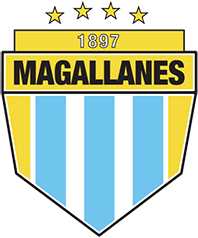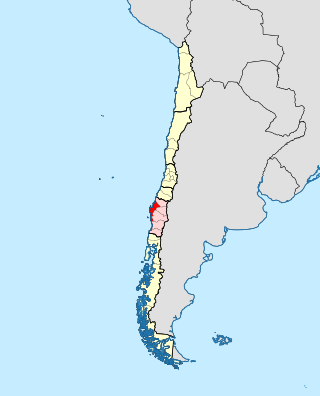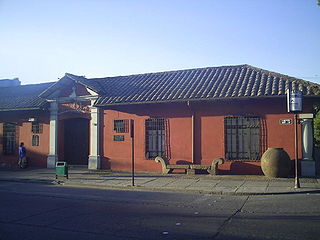| |||||
| Decades: | |||||
|---|---|---|---|---|---|
| See also: | |||||
The following lists events that happened during 1939 in Chile.
| |||||
| Decades: | |||||
|---|---|---|---|---|---|
| See also: | |||||
The following lists events that happened during 1939 in Chile.
Vergara may refer to:
The National Prize of Art of Chile, was created on November 9, 1942. It was awarded yearly since 1944 and alternated the mention among Painting or Sculpture, Music and Theatre. In 1992, it was replaced by the National Prizes of Plastic Arts, Musical Arts and Arts of the Representation and Audiovisual, respectively.

Magallanes is a Chilean football club based in San Bernardo, Chile. They play in the Primera B de Chile, after being relegated from the Chilean Primera División in 2023.
The Ariostazo occurred on August 25, 1939, and was a brief revolt of the Tacna artillery regiment, led by General Ariosto Herrera, in what turned out to be a non-violent attempt against the government of Chilean President Pedro Aguirre Cerda.

Marcos Maturana del Campo was a Chilean military and political figure who served in the Chilean War of Independence and the War of the Confederation.

The Roman Catholic Archdiocese of Concepción is an archdiocese located in the city of Concepción in Chile.

Rafael Valentín Errázuriz Urmeneta was a Chilean politician and diplomat.

Eugenio Cruz Vargas was a notable Chilean poet and painter. His art was developed under the naturalistic landscape and abstraction, and his collection of poems under the concepts of surrealism and culminate in the literary creationism.)
Pedro Nolasco Cruz Vergara was a Chilean literary critic, novelist, writer, and politician.

Pedro Nolasco Vergara Albano also known as Pedro Nolasco Martínez de Vergara Albano was a Chilean deputy, governor and farmer.
The following lists events that happened during 1857 in Chile.

Marta Vergara Varas was a Chilean author, editor, journalist and women's rights activist. Introduced to international feminism in 1930, she became instrumental in the development of the Inter-American Commission of Women (CIM) helping gather documentation on laws which effected women's nationality. She pushed Doris Stevens to broaden the scope of international feminism to include working women's issues in the quest for equality. A founding member of the Pro-Emancipation Movement of Chilean Women, she was editor of its monthly bulletin La Mujer Nueva. When she was ousted from the Communist Party she moved to Europe and worked as a journalist during the war. At war's end, she returned to Washington, D.C., and worked at the CIM continuing to press for women's suffrage and equality, before returning to Chile, where she resumed her writing career.

José Victorino Lastarria was a Chilean writer, legislative deputy, senator, diplomat, and finance minister.

Jorge Huneeus Gana was a Chilean attorney, writer, journalist, ambassador, legislative deputy, and cabinet minister.

Álvaro Casanova Zenteno was a prominent marine painter and of historic naval warfare, a statesman his art is classified as realist, expressionist, classical, and romantic.

Juan Albano Pereira Márquez was a Portuguese merchant and the godfather and tutor of Bernardo O'Higgins. He is the ancestor of one of the most important Chilean colonial families.

José Francisco Vergara Echevers (1833-1889) was a Chilean politician, war hero, cavalry commander, presidential candidate, engineer and journalist who was notable for founding Viña del Mar as well as his several military campaigns of the War of the Pacific.

The 1939 Nobel Prize in Literature was awarded to the Finnish writer Frans Eemil Sillanpää (1888–1964) "for his deep understanding of his country’s peasantry and the exquisite art with which he has portrayed their way of life and their relationship with Nature." He is the first and the only Finnish recipient of the prize.

Francisco Javier Bonifacio Hermojenes Correa Errázuriz was a Chilean farmer and deputy.

Diego Vergara Albano was a Chilean independence activist, deputy, senator, and landowner.